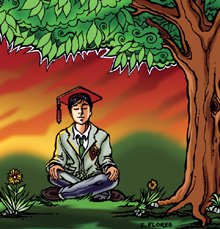Unacceptable: Many Teens Aren’t Emotionally Ready for College
It’s time to redefine “college prep.”

In dorm rooms and shared apartments across the country, anxiouscollege freshmen are unpacking their bags and moving intothe next phase of their academic journeys. Having successfullynavigated the educational system thus far, these budding intellectsare ready to take on the demands of higher education.
Or are they?
College enrollment is up, due in part to the increasing focus onhelping kids get accepted. They are thrown on the college track asearly as elementary school, and in many places they get institutionalhelp in meeting college-admission requirements long before highschool. More and more, private tutoring and counseling add to theacceptance chances of those who can afford it. Why, then, with all ofthis college prep, are the attrition rates of first-year university studentsso high? According to the 2007 "Condition of Education" report, bythe U.S. Department of Education's National Center for EducationStatistics, nearly half of all college freshmen never earn a degree.
This dropout rate, in many cases, is not due to any lack of academicskill. Instead, the reasons are related to a lack of emotional,social, and self-care abilities needed for a major life transition.Numerous studies cite self-esteem, stress, anxiety, depression, andminor health issues as the most accurate predictors of grade-pointaverages and enrollment-retention figures for college freshmen. Thehonors courses, standardized tests, and practice application essaysthat are the heart of the present college-prep formula do little toprepare students for these challenges. We have figured out how tohelp kids get accepted to college, but we fall short in helping themcultivate the skills needed to prosper there.
It is time to redefine "college prep." Getting into a college is justpart of the goal. We need to look beyond acceptance to the crucialadjustment kids have to make to life once they are there. Collegeliving demands a skillful shuffling of academic expectations withthe excitement, pressures, and demands of living independently -- often for the first time. Personal wellness, maintained through solidcoping skills and knowledge of holistic health, needs to be asimportant as academic excellence for students who want to thrivein college once they clear the admissions hurdle.
I am not talking about adding some New Age peripheral fluff tothe social-psychology class. I refer to the kind of realistic and practicalself-care training that is effectively transforming the corporateworld, the medical system, and other major institutions concernedwith production and success. This preparation is a matter of recognizingpotentially self-destructive stressors in a new situation and,given this particular audience, finding a fun and engaging way toteach proactive, preventative actions to cope with them.
An ideal college-prep curriculum would be based in experientialpractice and would emphasize self-reflection. High school studentswould explore various ways to prevent, manage, and respond tostress, and they would have the opportunity to discover whatworks for them before they succumb to the chaos of college life.Coursework and assignments would look at vital, practical issuessuch as the role of exercise and diet in emotional well-being and thevalue of time management, financial health, and social skills.Activities would be designed to give students a strong sense of selfand self-efficacy, as well as the resources they need to cope withchange. The idea is for students to get some practice in being independentin self-care before they are actually out there on their own.
College is a time of self-discovery. It is a period when students tryon different roles and characters, test their limits, and take risks withtheir new freedom. Without a strong sense of self and the toolsnecessary to weather the inevitable turbulence of this life change, itis all too easy to drown in doubt, confusion, and, in worst cases, self-destructive behavior. We need to make wellness wisdom an integralpart of college prep, not just to make sure that our kids graduate but also to improve the quality of their college experience.
Credit: Indigo Flores